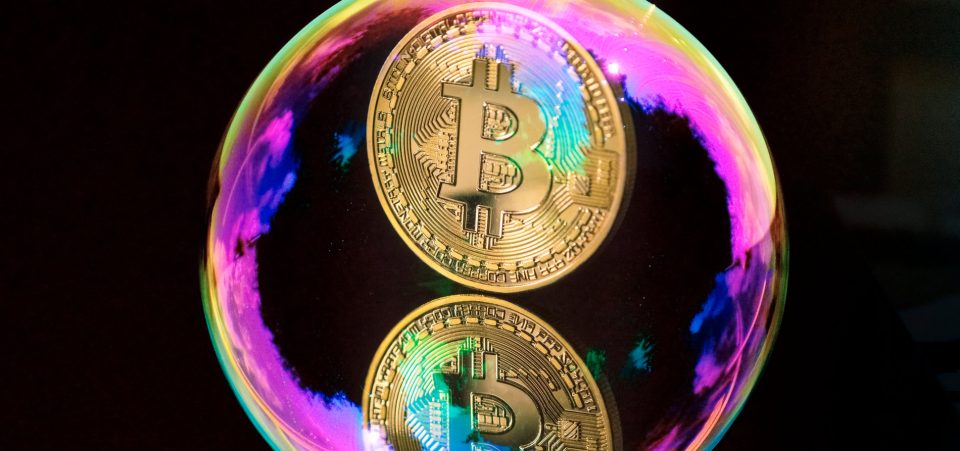Do Not Let Recent Gains Fool You. The Bitcoin Bubble Could Implode at Any Time
You’d think people had learned their lesson about cryptocurrencies—especially, Bitcoin—but no. Rather than pull away from the insidious presence that Bitcoin represents among “investment products,” some still believe it’s going to $50,000 in 2018. And after that, it’s going to the moon, via Mars. The fact that just two months ago, Bitcoin was trading as high as $19,551, only to drop to below $7,000 was not a sufficiently strong lesson, apparently. The Bitcoin bubble remains.
It’s hard to believe that, clearly, Bitcoin can still draw the speculative crowds. Instead of letting it fall and saving their money or putting it somewhere safer—like a bathtub surrounded by electric hair dryers—they decided that Bitcoin remains a great opportunity. “Why, it must be better than gold!” must be the investment philosophy.
It’s like catching a friend or employee stealing money from your wallet in flagrante delicto, pausing, and then handing them the keys to your car and your house. It has to be both, of course, because losing on Bitcoin is no laughing matter. Imagine those illuminated folks who bought Bitcoin at $15,000 or more. Still, mockery and sarcasm aren’t going to get to the root of the issue.
Is Bitcoin Worth All the Risk So Many Are Taking?
Or is it better to take your loss or profit and walk away while you still can? After all, if you are one of those investors who’s still capable of critical thought, you’ll have fair concerns about the health of the financial markets now. Perhaps you’ve considered investing in gold, which is performing much better than expected so far in 2018.
The price of gold per ounce has now comfortably settled above $1,350. And the gold price is often a barometer of stock market sentiment. When it goes higher, volatility and fear are high, raising the chances of a stock market crash. Therefore, the instinct to consider Bitcoin and other cryptocurrencies makes sense. But, only the instinct.
Even based on the price of Bitcoin at the time of writing (about $10,115) it will have to move almost 100% to resume trading at its record high. As for other cryptocurrencies, they too have dropped by similar triple-digit percentages from their highs.
Ethereum dropped by about 50% in the same period when Bitcoin was freefalling. But in the case of Ethereum at least, which was going for about $935.83 at the time of writing, the losses were in the hundreds or tens of dollars. Losses for those who bought bitcoins (the currency/coins, when written with a lowercase “b”) in the last quarter of 2017 are still untenable, even as Bitcoin has crossed the $10,000 resistance ceiling again.
Looking for Excuses Won’t Help
Some may be looking for excuses. They blame the legal restrictions that countries like China, South Korea, India, or Japan—and now Thailand—have imposed. They note that some credit card companies have made it harder to buy bitcoins using their services. Certainly, these measures may have dissuaded some eager buyers.
But, clearly, if Bitcoin and other cryptocurrencies have recovered from a ruinous turn of events, the trading restrictions have not worked. These restrictions have been no more effective at dissuading bitcoin buying than images of lung damage on cigarette packages have been at dissuading people from smoking.
Something else is happening and it’s as old as time.
Speculative greed and the thrill of gambling are possible explanations for Bitcoin. Consider the simple fact. Does anyone buy bitcoins to buy things? That is, is Bitcoin being used as a payment system to replace credit cards or wire transfers? Not really. They could use “PayPal” for that and other similar systems.
In other words, it’s not the technology behind Bitcoin that’s driving the speculation. Rather, it’s the value of a bitcoin. Bitcoin is not too dissimilar from a lottery ticket at its most extreme and an investment at its basic level. People are buying bitcoins to make huge amounts of “dollars” or “euros”—actual currencies.
Bitcoins and the South Sea Bubble
It’s much like the South Sea Company bubble of the 1720s or when the earlier Tulip Bulb bubble in 1637 imploded. Jan Brueghel the Elder was a gifted painter of flowers in the early 1600s. His depictions were so beautiful and colorful that they inspired those who could afford them to buy tulips with which to decorate their houses.
A veritable market of tulip bulbs emerged. And by the 1630s, the prices of tulip bulbs had gone as high as to rival the price of a luxury house. That certainly sounds like the course cryptocurrency advocates envisage for Bitcoin. Some, like John McAfee, have even said Bitcoin could be worth $500,000. (Source: “How Likely Is It That Bitcoin Will Hit $500k In Three Years?,” Forbes, January 5, 2018.)
At its peak price in December 2017, one bitcoin could buy a brand new small car. Even at the height of its recent deflation, a single bitcoin could buy a used small car. But, just months ago, bitcoins could buy the equivalent of an economy class N.Y. to L.A. air ticket. The tulip bubble took years to inflate. From “seed” to full maturity and wilt, it took three decades.
This suggests that just because Bitcoin has been recovering, that doesn’t mean it’s not going to finish the same way all bubbles do. News that JPMorgan Chase & Co. (NYSE:JPM) has created a Bitcoin-based exchange-traded fund doesn’t change this, of course. (Source: “Bitcoin BOMBSHELL: JPMorgan changes tune and says bitcoin-based ETFs are the ‘holy grail’,” Express, February 13, 2018.)
Remember that the big Wall Street banks were all too pleased to trade mortgage-backed securities, fueling the sub-prime mortgage bubble. JPMorgan’s boss, Jaimie Dimon, called Bitcoin a “fraud.” And just to be sure, I have also called it something similar if not worse than a fraud. (Source: “Bitcoin belongs more to the realm of fraud than finance or economics – analyst,” RT, February 10, 2018.)
The problem is that Bitcoin has become detached from its original purpose.
The Libertarian Ideal of Bitcoin Is All But Lost
At first, Bitcoin appealed to a few “libertarians” and people operating under the law. They liked the anonymity and thought Bitcoin would end the tyranny of central banks. That was an interesting goal and Bitcoin was an interesting tool, which has also made blockchain technology popular. Whatever happens to Bitcoin and its crypto rivals, blockchain technology will remain. However, the speculation that’s inflated the Bitcoin bubble of 2017, for the most part, has no relation to its original vision.
One of the problems with Bitcoin is that it’s an all too human product, for all of the cybertech aura around it. Therefore, it’s prone to speculation, which gets the very best of us. Sir Isaac Newton, he of the three laws of motion, lost his proverbial shirt on the big bubble in the 1720s that emulated the previous century’s tulip one.
In 1711, the South Sea Company was founded in Britain. It was an early example of “public-private partnership”—which Margaret Thatcher made popular as a model to sell off British government assets in the 1980s—to consolidate and reduce the United Kingdom’s national debt. The company was also granted a monopoly for trade with South America.
Newton, Marx, and Bitcoin
There was little chance of that then. Spain controlled South America and it wouldn’t be until at least a century later that Britain gained access to what was a Spanish dominion. But given the resources in the Spanish colonies, shares in the South Sea Company rose significantly.
Concurrently, the South Sea Company also ran a debt operation similar to a “lottery.” Suffice it to say, it blew up. But not before 10 years had gone by. Newton got caught in it twice, losing both times. The great physicist said—and I’m paraphrasing here—”I can calculate the motion of celestial bodies, but not the folly of the people.”
In another unlikely stock market scheme, none other than the father of modern communism, Karl Marx, also lost a sizeable sum in the stock exchange. If Marx himself bought stock in the expectation of profit, it’s easy to understand how strong the impulse to invest or speculate can be.
There’s no inherent market appeal for Bitcoin and cryptocurrencies. They don’t represent a new technology or the sum total of research that will lead to a new blockbuster drug, which can explain the huge P/E ratios of some biotech companies. Thus, we can only analyze Bitcoin in human or psychological terms. If Newton and Marx can get caught up in frenzied bubbles, it shows that even the most rational minds are vulnerable to the appeal of quick and fabulous wealth.
The Bitcoin bubble—I’m not afraid to call it as such—will probably swell again and fall a few times before we’ll be able to understand the true nature of the phenomenon. There is much randomness in this course. Those who have been lucky so far cannot really attribute it to skill or careful analysis. Careful analysis of what? It’s not like evaluating the prospects of an aerospace and defense stock in the context of record high military budgets and intense international tension, for example.
The mechanisms of the markets, says a famous historian and economist, Niall Ferguson, are more unpredictable than the weather systems. The variables are infinite. But in the case of the markets, they reflect the collective mood or sentiment of human beings.
As in all bubbles, from the tulip bubble to debt and improbable trade schemes to the 1929 and 2008 crashes, investors have a range from absolute fear to the irrational exuberance of the dotcom bubble and then the subprime crisis. Wherever greed gets the better of reason, bubbles will inflate and bubbles will burst. Bitcoin appears to be the most recent instance of such phenomena. It could be the most explosive bubble and ruin the most number of people, too.






